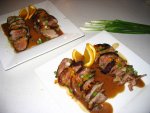
I used to make canard à l’orange, in fact, I once won a cooking contest with it. However, I got tired of how greasy it was. This promises to be better in that I’m not using the entire bird, but cut up into pieces. Formally speaking, a maigret refers only to the breast meat, but I was raised by parents who grew up during the Great Depression and will not throw away the rest, so I use the thighs too and make stock from what is left over.
This dish is served cooked, but rare, with the breast cut into medallions.
The picture at the right includes the two breasts on the plate at the top and the thigh meat on the bottom. In this implementation, the marinade was strained before being added to the sauce and the dish was garnished with orange zest, sliced scallions and a bit of orange.
Yield
One medium duck (breast and thighs) will serve 8 people if it is not the main course, 4-6 if it is.
Ingredients
| 1 large | duck (or two small ones) | |
| 1½ cups | Marsala or Muscat (dessert) wine | |
| 1½ cups | low-sodium chicken stock | |
| 4 | green onions, chopped | |
| 4 cloves | garlic, smashed | |
| 1 tbsp | Worcestershire sauce | |
| 1 tbsp | Dijon mustard | |
| — | kosher salt | |
| — | fresh-ground pepper | |
| 1 tbsp | olive oil | |
| 3 tbsp | butter |
Preparation
1. Thaw duck if frozen and carve to separate breasts. Debone them, but leave the skin.
Suggestion: To reduce fat in this dish even further, use a sharp knife to cut diamond patterns in the skin (but do not cut all the way through) prior to cooking.
The bones and remaining meat of the carcasse can go into the freezer for making stock (mix with chicken parts if you like), but do not include the skin which contains a lot of fat.
2. Combine ½ cup wine, ¼ cup stock, green onions, garlic, Worcestershire sauce and mustard in a ziplock bag with the duck breasts. Allow to marinate 2 hours (at most).
3. Heat oil in large skillet over medium-high. Remove duck from marinade and dry with paper towels. Save the marinade. Season the duck with salt and pepper. Place duck breasts skin-side down in skillet. Roll the duck back and forth to render the fat from the skin and brown the breast skin for 5 minutes.
Suggestion: Don’t blacken the meat or skin. After a minute at medium-high, drop the heat to medium so that the fat renders out before the skin blackens. Drain a little fat off during cooking rather than beginning to frying rather than sauté the duck.
4. Turn duck over and reduce heat to medium. Cook to desired doneness (I suggest leaving the duck medium rare—about 12 minutes depending on thickness of the breasts). Transfer to plate to rest.
Important: After tranferring the duck to the plate, make certain you pour the drippings (fat) out: duck fat will not make your dish pleasant for most people at all.
5. Add to skillet over medium the rest of the wine, stock, butter and ½ cup of the marinade. Reduce to about ¾ cup, whisking often. This may take 15 minutes. Drizzle this sauce over duck breast sliced into medallions.
maigret de canard est la dénomination réservée aux muscles de la masse pectorale constituant le filet prélevé sur un canard ou une oie engraissée par gavage en vue de la production de foie gras. Il doit toujours être présenté avec sa peau.